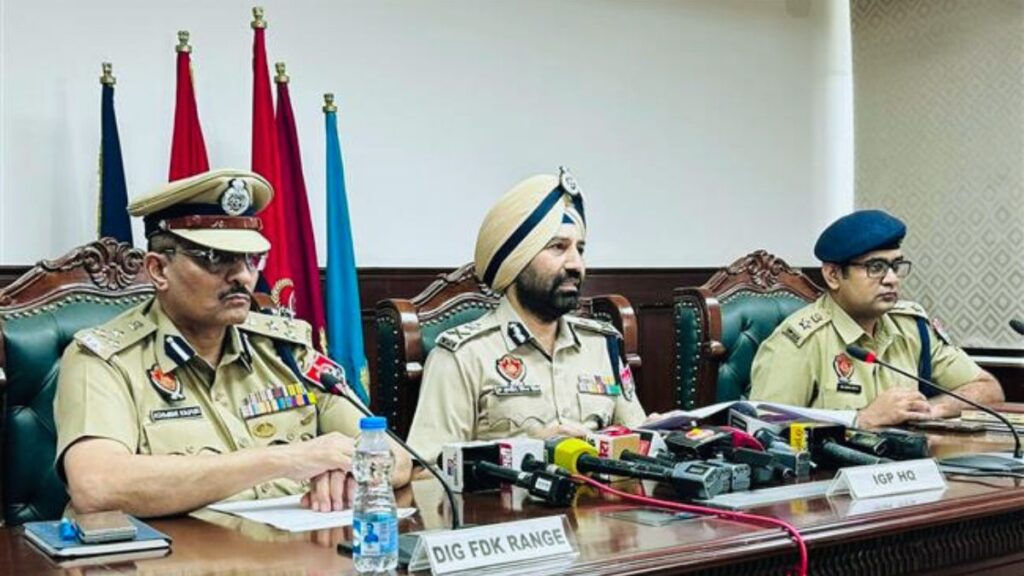400 Gram of Heroin Recovered in Bold Operation at Tarn Taran Border
A significant operation near the Tarn Taran border has led to the recovery of over 400 grams of suspected heroin and other items believed to have been smuggled across the border. The search was made possible through a joint search operation by the Border Security Force (BSF) and the Punjab Police on the basis of credible intelligence about the presence of heroin in the area.
During a search in a field near Kalia village of Tarn Taran district, officials recovered 473 grams of heroin. The substance was wrapped in yellow and black adhesive tape. Along with the heroin, a metal ring and a light fixture were also found, which were attached to the packet of heroin.
This operation highlights the ongoing and successful collaboration between BSF and Punjab Police to combat cross-border smuggling activities. Notably, a similar joint operation in May resulted in the seizure of a significant consignment including arms, ammunition, over 3 kg of heroin and over Rs 3 lakh in cash. The operation took place in Rajoke, another village of Tarn Taran district.
Also, last month, the intelligence wing of the BSF received information that a Chinese-made drone was recovered in the same district. The incident marks the second drone-related search after another drone was found in a field near Noorwala village on June 22.
These operations underline the continued efforts by Indian security forces to prevent the inflow of illegal substances and smuggling into the country, particularly the Tarn Taran border region, which has seen a series of such incidents.
The recent recovery of suspected heroin near the Tarn Taran border highlights the continuing and evolving challenges facing the security forces in Punjab, particularly in districts bordering international borders. The region has been a focal point for smuggling activities, often involving drugs, weapons and other contraband. The strategic location of these areas, close to the border with Pakistan, has made them vulnerable to cross-border smuggling networks that often use sophisticated methods to evade detection.
The involvement of advanced technology, such as drones, in these smuggling operations is a concern. The recovery of Chinese-made drones in Tarn Taran district highlights the growing use of unmanned aerial vehicles (UAVs) by smugglers to transport illegal goods across the border. These drones are often used to drop packages containing drugs, weapons and other illegal goods into Indian territory, bypassing conventional security measures. The discovery of such drones in successive months indicates that this method is becoming more common, requiring monitoring and countermeasures.
Cooperation between the Border Security Force (BSF) and the Punjab Police is playing an important role in combating these smuggling activities. Their combined efforts have not only made significant recoveries but also helped dismantle some of the networks involved in cross-border smuggling. Intelligence sharing and coordinated operations have proven effective in responding quickly to threats and preventing illicit shipments from reaching their destinations.
Apart from heroin, the recovery of items such as metal rings and lighting equipment attached to drug packets indicates that traffickers are using innovative techniques to ensure the safe passage of their drugs. These objects can be used to mark locations for retrieval or to signal to partners on the Indian side, indicating the exact drop points for smuggled goods. The presence of such paraphernalia along with heroin indicates the level of planning and sophistication involved in these trafficking operations.
Tarn Taran district, in particular, has emerged as a hotspot for such activities, with several incidents reported over the past few months. The district’s proximity to the border and its vast agricultural areas, which offer cover and concealment, make it an ideal place for smugglers to operate. Security forces have been vigilant in their efforts to monitor these areas, but the scale and frequency of smuggling attempts continue to be a challenge.
The wider implications of these trafficking activities are significant not only in terms of law enforcement but also in relation to national security. The flow of narcotics, weapons and other paraphernalia across borders has the potential to fuel criminal activity and destabilize local communities. Additionally, financial proceeds from drug trafficking can be used to fund terrorism and other forms of organized crime, further threatening the security of the region.
In response to these threats, BSF and Punjab Police are working to strengthen their capabilities. This includes the deployment of advanced surveillance equipment, increased border patrols, and the use of intelligence-led operations to thwart smuggling attempts. Community engagement is also being emphasized, with local residents being encouraged to report any suspicious activity in their areas. This approach not only helps in gathering actionable intelligence but also fosters a sense of collective responsibility for the security of the region.
Despite these efforts, the fight against cross-border smuggling is far from over. Smuggling networks are constantly adapting their tactics, finding new ways to exploit weaknesses in border security. The use of tunnels, the exploitation of river channels, and the involvement of local collaborators are some of the methods that have been used in recent years. This requires a dynamic and flexible response from security forces, who must stay one step ahead of traffickers.
Going forward, greater international cooperation is needed, particularly with Pakistan, to address the root causes of trafficking and dismantle networks that operate across borders. Diplomatic efforts aimed at border security and intelligence sharing can play an important role in curbing these activities. In addition, stronger legal frameworks and stricter enforcement are needed to prevent people from participating in trafficking operations.
Consequently, the recent recovery of heroin and other items near the Tarn Taran border is a testament to the ongoing efforts by the BSF and the Punjab Police to combat cross-border smuggling. However, the scale and complexity of the challenge require a consistent and multifaceted approach. As security forces continue to adapt and innovate, it is hoped that such operations will significantly reduce smuggling activities, thereby increasing the safety and security of the region.

In a significant breakthrough, the Punjab Police has successfully dismantled a cross-border smuggling module, highlighting the ongoing battle against illegal activities perpetuated by international networks. The arrest of Rajwant Singh, also known as Raju, is a testament to the relentless efforts of law enforcement agencies in curbing the influx of drugs and weapons into India. …
Stay connected with NH Punjab on social media. Follow us on Facebook, Twitter/X, and Instagram for the latest news updates, behind-the-scenes content, and more. Engage with us online and be a part of our growing community.
Sign up for our newsletter to get the latest news delivered straight to your inbox. Follow us on social media for real-time updates and

International Drug Smuggler Arrested in Punjab Police Operation
Simranjot Singh Sandhu International Drug Smuggler arrested The Punjab Police, in a remarkable collaboration with a central agency, has successfully apprehended Simranjot Singh Sandhu, an international drug smuggler and the mastermind behind the notorious 487 kg cocaine smuggling case in Germany in 2020. Director General of Police (DGP) Gaurav Yadav announced this significant development on …
Have questions or need more information? Feel free to reach out to us through our Contact Page. You can also learn more about our mission and team on our About Page.
For more details, visit our Privacy Policy, Disclaimer, and Terms and Conditions.
Stay connected with NH PUNJAB (Punjabi), where your news journey begins.

Effective Action: NCB Detains Notorious Drug Lords Akshay Chhabra and Jaspal Singh Goldy
NCB’s Bold Move – Two Drug Lords Detained, Syndicate Disrupted The Narcotics Control Bureau (NCB) has once again demonstrated its commitment to dismantling drug syndicates by detaining two notorious drug lords, Akshay Chhabra and Jaspal Singh, alias Goldy, under the Prevention of Illicit Traffic in Narcotic Drugs and Psychotropic Substances (PITNDPS) Act. This decisive action, …

